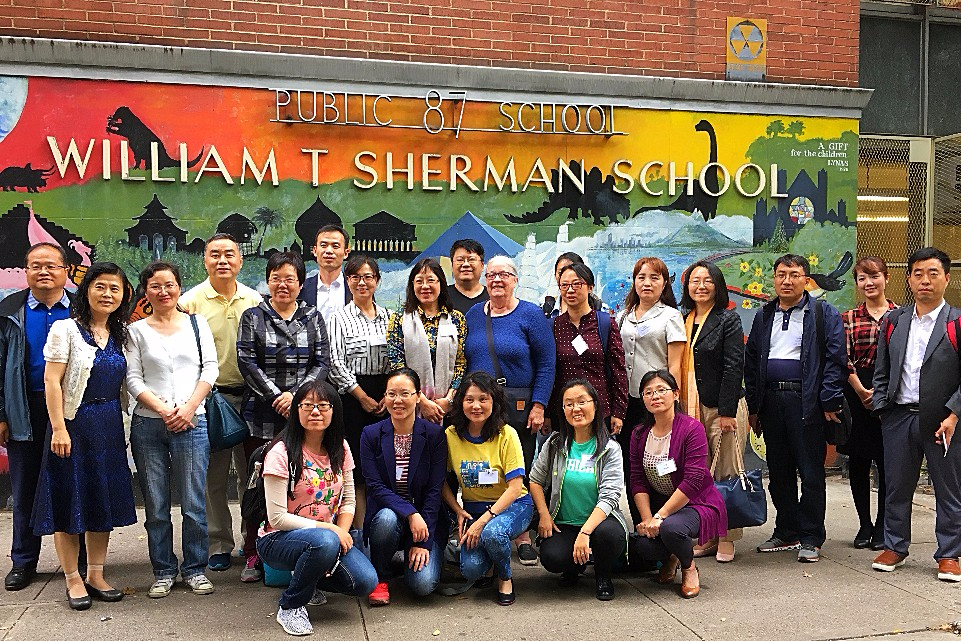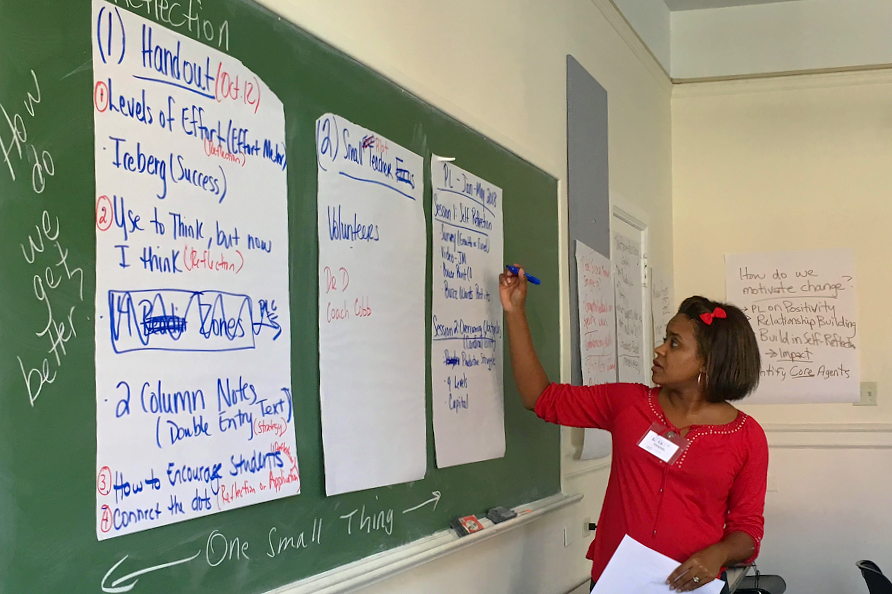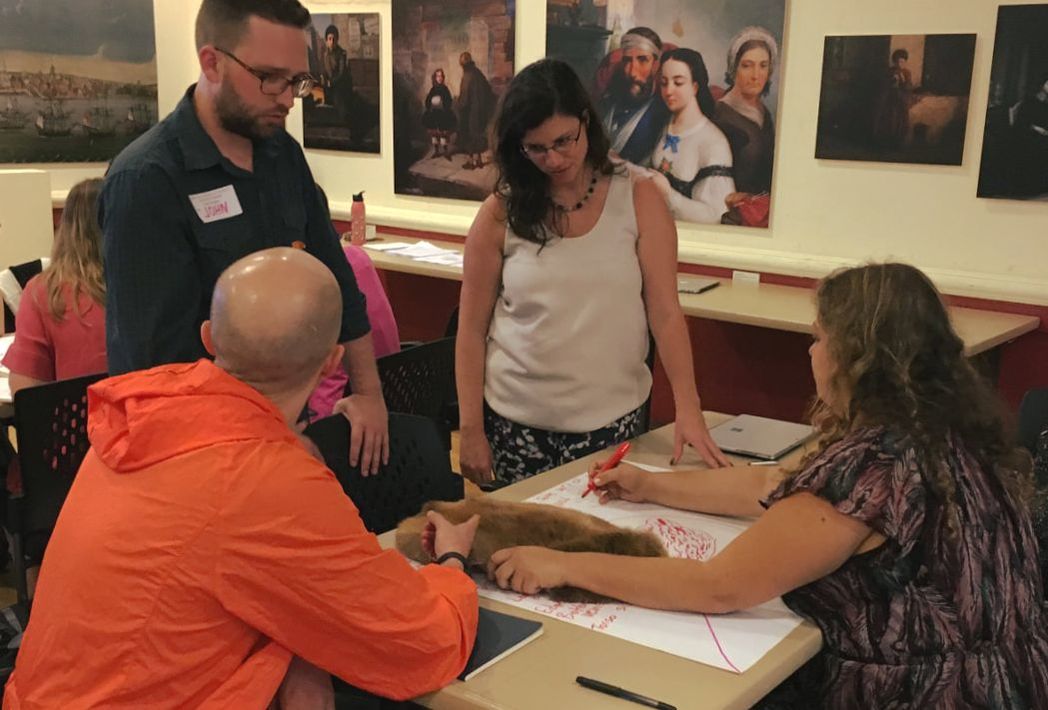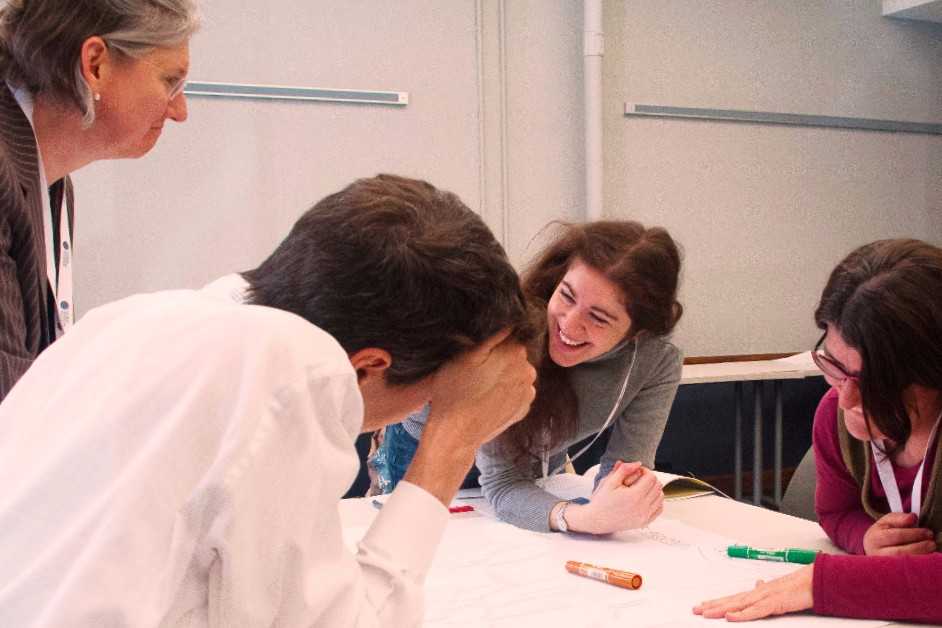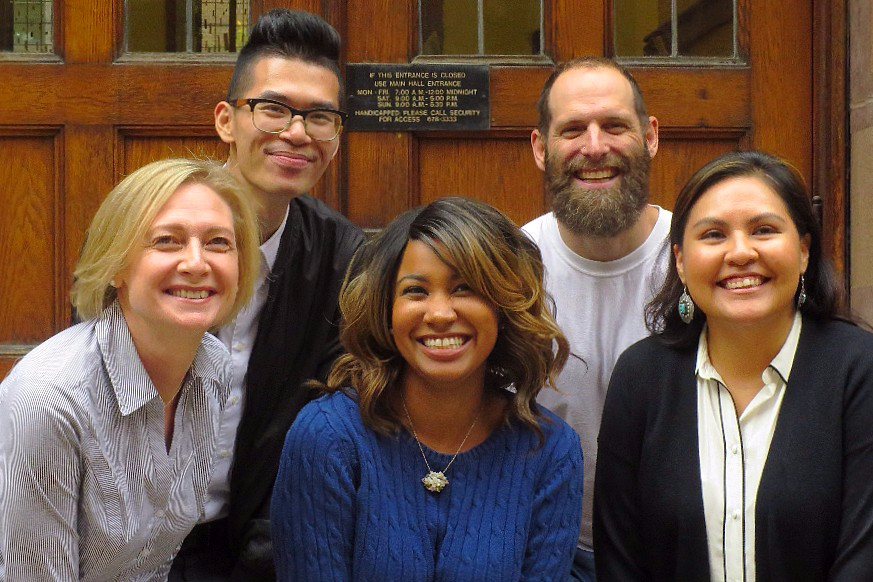|
“There’s nothing like the first day of school,” a cooperating teacher said in the first week of student teaching. And she was right. There’s nothing like meeting your students for the first time; seeing nothing but promise and possibility. But it doesn’t take long for those rosy feelings to begin to fade, and for the daunting task of the work ahead to become overwhelming. That’s where we come into view.
We've been busy this fall, working alongside teachers and school leaders, and engaging in projects that help folks hold on to the promise of the first days of school. To keep sight of those possibilities. And to get live support when things get rough. How can we support you?
Exploring global capacities with educators from Tianjin, China
We hosted our third annual Global Capacities Institute at Teachers College last month, and were joined by twenty education professors from Tianjin Normal University in China. The week-long Intensive focused on the key features of 21st century skills and experiential workshops that exemplify ways of bringing learning to life.
The TNU professors were encouraged, equipped, and empowered during their week at CPET. They were encouraged through daily keynote speakers Dr. Ruth Vinz, Dr. Jinjin Wu, Kay Gordon & Sam Shreyar, and Dr. Xiaodong Lin whose content included Teaching in the 21st Century, A History of the Educational Partnership between Teachers College and China, Early Childhood Education in China, and Innovation: How Failure Leads to a Productive Future. They were equipped by exploring literature through multiple modalities with Literacy Unbound, imagining student publication as a path to authentic audience and focused genres with Student Press Initiative, and experiencing design thinking as a method to implement their learning during the Institute. They were empowered to move forward with their learning as they visited local schools, observing 21st century teaching in action, followed by a Q&A with school leadership. The TNU team was also able to engage with Mr. Matt Mazzaroppi, principal of CPET partner school Morris Academy for Collaborative Studies, to consider how the social-emotional health of their students can be supported and improved by strengthening school structures to support caring relationships student-to-student, teacher-to-student, and teacher-to-teacher. One participant summed up the experience by saying, “CPET made a perfect schedule for our study here. All the keynote speakers were really terrific. These lectures and workshops benefited us greatly in both our research and teaching, especially the teaching methods. This institute provided us a completely new perspective. Although we knew the terms ‘activities’ and ‘experiences’ before, the experience at TC [helped us understand] what ‘activities’ and ‘experiences’ can look like in our classrooms. It will be very helpful for our teaching in the future.”
Strategizing school improvement with Georgia's Osborne High School
Leaders from the oldest high school in Cobb County, Georgia joined us in September for the second annual School Improvement Institute. Osborne High School’s learning community is committed to promoting academic excellence by providing a support system that is not usually evident in the traditional high school setting, which was a great fit with our customized approach to professional development.
Osborne identified areas they wished to explore: cultivating strengths in teachers and students, designing the productive struggle, and establishing systems that support struggling students. Our facilitators provided a foundation of morning inspiration by bringing research to life and considering the implications for practice, and an afternoon practice aimed at supporting small group work sessions and developing actions plans. Each day our Osborne colleagues dug deep in the morning and planned strategically in the afternoon. Osborne leaders identified goals at the start of the institute, including:
When the Institute closed, leaders reflected that they had met their goals, established a strong and flexible plan for implementation, and were headed back with a host of resources to use with teachers. Our connection with these amazing educators deepened, and we can’t wait until the next time we are all together again. Go Cardinals!
Connecting the dots to increase inquiry-based pedagogy & learning
Over the course of the next two years, twenty experienced, new, and pre-service social studies teachers will engage in a research-to-practice partnership to promote women’s history and inquiry-based pedagogy in New York City public school classrooms. The teachers will participate in workshops hosted at the New-York Historical Society’s Center on Women’s History and a pedagogy course on women’s history hosted at Teachers College.
Participants already started engaging with the N-YHS’s Objects Tell Stories program this fall, where they explored a variety of objects from New York City’s colonial period housed in the museum. In October, the vice president of the N-YHS libraries led a workshop on the society’s archival collections, and in November, participants will visit the museum’s new Hotbed exhibit on the history of women’s suffrage in Greenwich Village. In the spring, teachers will use what they have learned in the N-YHS workshops and the women’s history pedagogy course to create their own inquiry-based curriculum unit and implement that unit in their classrooms. This project aims to help teachers use museums and their holdings to develop historical inquiry, use libraries and archives to find the answers to these inquiries, and increase teacher confidence to implement inquiry-based pedagogy and learning. During the program, participants will incorporate the use of museum artifacts, historical sites, and archival documents in their classrooms to increase inquiry-based learning and the representation of marginalized groups in their curriculum.
Making data meaningful with PS114
Our partnership with PS114 in Brooklyn has been focused on enhancing their teachers' ability to draw upon state test data to guide instruction. To do this, our team helped develop a multiple regression model to test existing school data as predictors of student achievement. Using this model, we identified higher and lower priority indicators of student success to track in order to plan interventions this school year. We paired this model for intervention with an emphasis on improving our own data tracking capacities and when state test proficiency data came in, we supported the school in identifying where classroom-based assessments were more predictive of end of year performance. Using this evidence, we are now working with teachers across grade levels to export these promising practices for use toward cultivating evidence responsive pedagogy.
To inform our continued work with PS114 this fall, we partnered with the school to create detailed state test reports based on the June instructional reports released by the state. These CPET-created reports presented weighted achievement results within and across domains, combined with a nuanced analysis from our data specialist. Many teachers remarked that these reports provided the clearest and most relevant state test data they had seen. One teacher shared, “In the past, I’ll be honest, I would not even look at the data because it was too hard to read. But this was so clear that I was actually able to understand what the numbers meant for my class.”
Meet the Zankel Fellows!
For nearly 15 years, CPET has sponsored recipients of the Arthur Zankel Urban Fellowship as they work in partnership with our Student Press Initiative (SPI), which focuses on helping teachers and school communities to better plan and produce all-inclusive learning experiences that culminate with students publishing their writing.
This year, we are very excited to welcome a new cohort of five fellows - Shannon Alison, Jennifer DeCerff, Alexander Lee, Andrew Ravin, and Andrea Wiley - each with impressive skills and backgrounds, including experience teaching throughout the US and abroad. We are confident each of the fellows selected this year will make wonderful additions to our team. With support and supervision from our advanced professional development coaches, each fellow will have a unique opportunity to further their knowledge, interests, and expertise by helping teachers and students across the city to share their stories, understandings, and reflections through publication projects with our partner schools. Already in motion this year: a memoir project focused on supporting ENL students in the Bronx in sharing their experiences as immigrants, an ELA project aimed at supporting high school seniors in crafting personal statements for college applications, and a Humanities project which is still in the early planning stages. Our Zankel fellows will support these projects by collaboratively planning with teachers and assisting in curriculum and publication design. They will also visit classrooms, lead presentations, and provide individual support to students. At the end of the school year, Fellows will also facilitate publication showcases, where students present their writing to the greater SPI community. Along with projects with our partner schools, fellows will also participate in a CPET center project, which is inspired by their individual passions and will contribute to their growth, as well as our center-wide initiatives. This year, center projects include developing a workshop series to support student public speaking and performance skills, a research study to examine the impact of publication projects on students’ efficacy and performance in writing, and the design of a multi-media platform to share information with prospective schools about the publication process and experience. |
|
The Center for Professional Education of Teachers (CPET) at Teachers College, Columbia University is committed to making excellent and equitable education accessible worldwide. CPET unites theory and practice to promote transformational change. We design innovative projects, cultivate sustainable partnerships, and conduct research through direct and online services to youth and educators. Grounded in adult learning theories, our six core principles structure our customized approach and expand the capacities of educators around the world.
|
ABOUT US
525 West 120th Street, Box 182 New York, NY 10027 416 Zankel Ph: (212) 678-3161 [email protected] Our Team Career Opportunities |
RESOURCES
Professional Articles Ready-to-Use Resources Teaching Today Podcast Upcoming PD Opportunities |
COACHING SERVICES
Custom Coaching Global Learning Alliance Literacy Unbound New Teacher Network Student Press Initiative |

